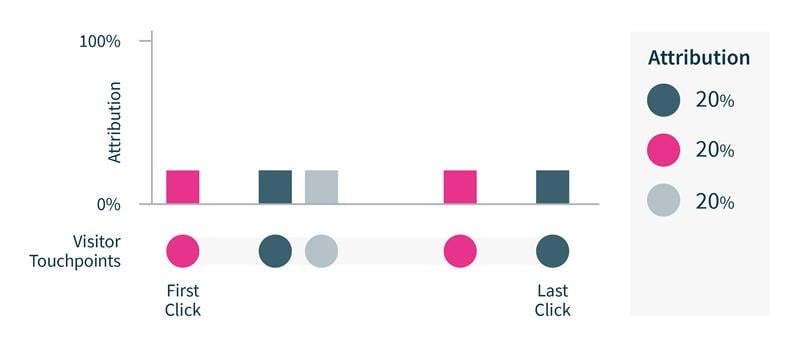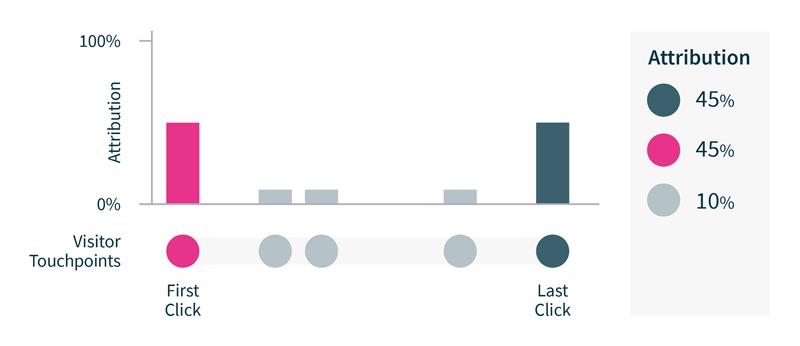It’s every marketer’s dream to be able to directly link sales to their campaigns. If you want to improve your overall marketing strategy, you need to have that in-depth knowledge of the activities that are genuinely persuading customers to convert.
That’s why marketing attribution is such an important element of reporting and analysis. Introducing multi-channel marketing attribution enables you to assign value to each of your marketing touchpoints. This helps you understand which ones have the most impact on your bottom-line and means you can optimise budget and performance more effectively.
In this blog, we’ll explore the magic of multi-channel marketing attribution, helping you understand how it differs from other models of attribution and why it’s so important for your marketing teams to understand and implement.
What is multi-channel marketing attribution?
Did you know that only 17% of marketers look at the performance of all their digital channels together? Just imagine all of the incredible insights you could be missing out on by looking at just one part of your overall campaign.
Multi-channel marketing attribution is important because it acknowledges that customers are exposed to multiple touchpoints before making a purchase. It divides the credit for conversion across multiple touchpoints, which can include channels such as email marketing, PPC, organic social, website visitors and paid social.
This gives you a more holistic overview of the customer journey, regardless of how complex or fragmented it may be. As a result, you have the information you need to flex your marketing strategies and adapt your ad spend in line with larger market trends and customer behaviour.
Why is multi-channel marketing attribution so important?
Marketing attribution is important because no two customer journeys are the same. Marketers are running complex campaigns designed to reach customers across multiple touchpoints, which means that your customers are taking different paths to conversions.
Multi-channel marketing attribution will not only help you map that journey effectively, but it will also clearly define the value of each touchpoint to show you what you should be doing more of… and which activities you might want to ditch. If you’re familiar with marketing attribution, you might be wondering, what’s the difference between multi-channel marketing attribution (MCA) and marketing mix modelling (MMM)?
Marketing mix modelling tends to be more difficult to implement, as it relies on multivariate regressions - a mathematical model - to predict impact of particular sales and marketing tactics. While it can consider variables such as historical data and external influencers, it requires a lot of data and complex algorithms to implement well.
Multi-channel marketing attribution gives you the full picture without the headache. It uses individual data to evaluate the value of your marketing activities and providing quick and actionable data that can improve the performance of your campaigns and optimise your budget.
What types of multi-channel attribution models are there?
There are three commonly used multi-channel attribution models: linear, positional and time-decay.
Linear

Attributes the conversion equally to each of the touchpoints during the acquisition process. The upside is it tends to be more sophisticated than first and last click models, with adding too much complexity when implementing. The downside is results are often questionable – if a customer visits the same channel twice it will get double the credit – and it fails to identify those superstar moments that convert a lead into a customer.
Positional

Attributes the conversion across each of the touchpoints, but upweights toward the first and the last. This is one of the more sophisticated models, in that it recognises the complexity of customer journeys and the resource that goes into acquiring and converting customers. The upside is it’s particularly useful for multi-channel marketing campaigns. The downside is it doesn’t factor in timescales.
Time decay
Attributes the conversion by assuming that the closer a touchpoint is to purchase, the more credit should be given for conversion. This is grounded in the theory that the buyer journey accelerates toward the end, meaning those final touchpoints are the most critical for conversion. This is particularly effective in understanding which tactics lead to the biggest step changes during the buyer journey and monitors the impact of call to action. However, it risks attributing too much value to those touchpoints when the purchase decision was made much earlier in the research phase. This makes it unsuitable for industries or markets that work to longer lead times.
How can I implement multi-channel marketing attribution?
We’ve established that multi-channel marketing is a must-have solution for your marketing team, but without the right tools, it’s hard to know where to start. Luckily, there are just three things you need to do: collect data, combine data sources, and visualising data in a way that enables you to extract relevant insight for your marketing.
That’s where Call Tracking comes in. Call Tracking can assist with covering potential blind spots in your customer journey, by collecting data that can connect your touchpoints with the calls that led to a purchase. It allows you to connect in-depth marketing data such as keywords and marketing channels to those winning calls.
Multi-channel marketing attribution relies on being able to see the full picture. It’s not just about collecting data. It’s about combining multiple sources and visualising it in a way that makes sense. That’s why Infinity’s suite of tools are designed to integrate seamlessly with a range of partners - including Google, Facebook and HubSpot - letting you analyse data how you want it, when you want it, in the format that suits you best.
Key takeaways
Let’s review what we’ve learned about multi-channel marketing attribution and how you can use this, alongside Call Tracking, to optimise your campaigns and drive more sales.
-
Multi-channel marketing attribution gives you a holistic overview of your marketing campaigns, to understand the shape of individual buyer journeys based on real customer data.
-
It allows you to ascribe value to touchpoints - such as email, PPC, paid social - and understand which contribute to conversion and enable you to focus spend and effort.
-
It is easier to implement than other models such as marketing mix modelling as it doesn’t require mountains of data and complex algorithms, but provides a level of complexity that you can’t get from more basic marketing attribution models.
-
Call Tracking can assist with creating better multi-channel marketing attribution by connecting the dots between your online and offline activities - as well as offering partner integrations - to give you a more complete picture of the customer journey.
Every conversation matters. Start one with us to discover how Call Tracking can help you optimise your most valuable customer conversations.